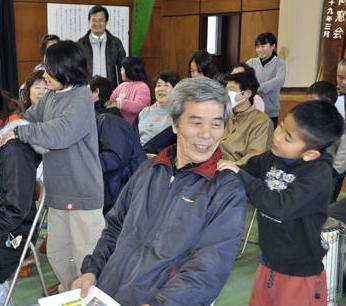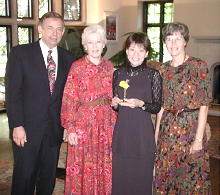|
||||||||||||||||||||||||
UPDATED June 9, 2012
On April 10 our LifeNets representative Dr. Yumi Yamamoto received a request from a nurse, Mrs. Sato, in the affected Fukushima area. There is a seven year old boy Tatsu who has a small inborn eye ball and has been wearing an artificial eye. His house was completely destroyed by the earthquake. In Japan April is a new school term, and just a few days ago he had a celebration ceremony of entering elementary school. Because he is getting bigger, his artificial eye got smaller and parents wanted to buy a new one for him. If he suffers from a defect of the complete eye ball, the government will pay for it, but because his problem is a "small eye ball," there is no way to get any help. The cost is about 90,000 yen ( about 1125 USD). Tatsunori became a first grade student of elementary school in Fukushima, Japan. Fortunately he and all his family survived from the earthquake and the tsunami last year. Now his parents are working very hard to build a new house. Tatsunori is a healthy cheerful boy who enjoys his school life very much. His only health problem is he was born as anophthalmia (congenital defect of the eye when a baby is born) and he wears an artificial eye in the left eye. Because he is growing bigger now, it was time that he needed a new artificial eye, but Japanese public medical insurance does not cover the charge of it and his parents could not afford to pay for it. His parents knew it was one of the most necessary things for the boy to start a new life in elementary school with many other new friends and people, and they were sad because they could not afford it. Here is a letter from his mother: - Akemi (mother) and Tatsunori Shiraishi, Iwaki, Fukushima See more with standalone story UPDATED March 6, 2012
This week it has been almost a year since March 11th, 2011. I appreciate your kind consideration for Japan through the year. On February 1st, there was a symposium in Kochi City where I live. The subject of the symposium was 'What we can do in the disaster for visually handicapped people'. Four people from Iwaki in Fukushima were invited as the panelists. They were Dr. Kimura, Mrs. Sato (a nurse at Kimura Clinic), Mr. Sakano (a patient of the clinic), and Mrs. Sakano (his mother). Dr. Kimura and Mrs. Sato told us how they helped people in the confusion after the big earthquake. At Dr. Kimura's clinic, there were unoccupied beds, and they decided to bring visually handicapped people from the shelters. They tried to get the information of the people, but in the chaos, nobody gave them any information. Some officials even said they needed to protect privacy of the citizen. What they did was that they visited shelters by themselves and found mothers with babies, who were the most easily recognized even in the crowded shelters.
They said after the news of explosions at the nuclear plants, everyone tried to leave the city. They could hardly see any people in post offices, electric companies, super markets, telephone companies, hospitals, city offices, etc. The city was deadly quiet and empty. Mr. Sakano, 39 years old, was diagnosed as diabetes when he was around 35 years old. Unfortunately the disease affected his eyes. In spite of several ocular surgeries, he became blind. After that he was living reclusively in his house. He was desperate at his future and life and he had very bad feelings with doctors who (he believed) made him blind. On March 11th, 2011, he felt unusual big shakes. His house was far from the ocean, and the tsunami did not come there. But after the earthquake, every life line stopped, including water, electricity, telephone, and gas. He and his mother had to go to the shelters with other people. There he found how difficult it was for him to live in the unfamiliar circumstance. He never knew how to use the bathroom except his own house. The important messages such as the time of next foods provides were put on the walls as posters. Because he was with his mother, he could know about them. He noticed he could not live there without help and communication with others. He had to tell people around him that he was blind, and he needed help. Then, he found out, people would help him, and become friends with him. He and his mother spent more than a few months at different shelters before they moved to an apartment which the city provided. He is not living like before any more. He has friends and enjoys going out for picnic, cooking school or any other activities with Dr. Kimura, Mrs. Sato and other volunteer people in Yukari (read about my previous reports). He knows how important it is to communicate with people. He concluded his speech that greetings are the most important at any circumstance. UPDATED August 11, 2011 Here is Dr. Yumi Yamamoto's August 2 message to us at LifeNets: Hi, it was a secret between Ms. Sato and me. We thought you and Bev would be very surprised and pleased to see the message board!! It was my idea, but Ms Sato (and Yukari volunteers) cooperated and worked out so that people would write personal messages to send directly to you like your help was arrived directly to them. I think they are so sweet, and they really wanted to show their gratitude to those who donated. I still have some money left, and yesterday I sent mineral water bottles there, because water from the faucet smells awful due to too much sterilization and even if it is 'biologically clean', there are no patients who want to let their children drink it. It is natural that people buy water to be used by their body. I also got a letter from a seventy-year old lady today. A few weeks ago a woman who wanted a sewing machine wrote me. I wrote her back to write us in more details. In today's letter she wrote that she lost her house in the tsunami, and because the area is within 20 kilometers from Fukushima nuclear plant, she does not know when she could go back to her hometown. Her precious sewing machine was gone by the tsunami too. She has not learned how to sew, but she used to enjoy sewing small things such as bags, clothes. She writes she felt 'excited' when she knew that LifeNets might give her a new sewing machine. A cheap and handy but fine enough sewing machine could be bought and sent to her by about 100 USD. I think I ll send her some materials and colorful threads by my own donation, too. Oh, maybe she needs scissors, too!! I hope this old nice lady can be happy with LifeNets sewing machine! Now, she lives in an apartment house which was provided by the city.
Victor, through this series of disaster, what I have been moved most is how Japanese people behave orderly and unselfishly. At Yukari we received a lot of aid not only from LifeNets but other organizations, and we can easily imagine everyone wants to get as many as they can at such a circumstance. But Yukari volunteers made a rule. They put 'points' to each goods, such as 100 points to slippers, 200 points to laundry detergents, etc. and they decided each person could get 600 points at one time. So, people do not fight, and think what they really need. You may notice in the pictures that each women have plastic bags with similar size full of goods they chose thoughtfully. They look satisfied and thankful with what they had chosen and received. Victor, please edit this and post it. Of course you can post pictures attached in this message. Women knew and understand they will be famous and international through LifeNets!! Love, PS: Letter from lady receiving sewing machine: I think I will keep living with courage." Tomii Igari (70 years old),
UPDATED July 19, 2011 Dear Victor, I had received a lot of heartfelt messages of gratitude to LifeNets from people in Iwaki City, Fukushima Prefecture.
By now many people at the disaster area have left the shelters and moved to temporary houses which the government prepared. There are people who lost their families, houses, furniture, cars, or just cannot go back to their houses because of the nuclear contamination. All of them have to recover their lives, but many are lacking in every daily things to start their lives from a scratch. Besides electric fans, LifeNets had sent following items to the area; retort pouch curry, new T shirts for adults, Miso soup powder, corn soup power, cling wraps, table duster, kitchen sponge, laundry detergent, hand soap, Magiclean (kitchen), Magiclean (toilet), hair shampoo, Japanese green tea, insecticide spray, etc. Because many people there do not have enough clothes, my friends in Kochi Prefecture, which is far away from the area, donated summer clothes and Lifenets paid the charge of the transportation.
The volunteer group 'Yukari' at the area helped to distribute these things to those who were in need. Now people have to be independent of the support by the government, and they are struggling for going through this hot summer. I believe your support is great help for them. Thank you very much. Yumi Yamamoto UPDATED July 12, 2011 Some of the aid money has been used to send much needed electric fans to the citizens in Iwaki City about 30 miles from the Fukushima nuclear reactor. Yumi Yamomoto writes about our last LifeNets initiative.
Hi Victor, You know it is the rainy season and it is very hot and humid. The electric fans were really helpful there. In Fukushima, they are afraid of opening windows due to a risk of nuclear contamination, but many people cannot afford to turning the air conditioner on, because they are really poor now. Of course there are people who do not have air conditioners at the shelters, temporary houses, or new apartments. There are many old people who are carried to
hospital because of heart attack caused by mental stresses or
dehydration. Young mothers are so afraid the influence of nuclear to
their children. They don't know what to eat or what to drink. And even
yesterday there was news about shakes at several places in Japan,
including Tohooku area. It has passed 4 months now, Victor. UPDATED July 1, 2011 Here are messages from Mr. Abe and Mrs. Hashimoto, who are visually handicapped, and lost everything by the disaster on March 11th. Below their thanks messages you will find more about what happened. Mr. Abe wrote; "I really appreciated for your beautiful message and strong support for what I had to suffer after March 11th. My house and everything were destroyed and gone by the earthquake and the tsunami. Though some of my family members included myself were flown away by a powerful stream of the tsunami, I think it is a consolation that none of us were injured seriously or killed. Now I feel a terror of the natural disaster, and I also feel how happy it is that our family are all safe and can live together. I want to give my heartfelt gratitude for your warm kindness, and say thank you from the bottom of my heart."
Ms. Hashimoto wrote; "I was very moved by the warm support from people who are far away in USA. Thank you very much. I also recognize this kindness was brought to me with help of volunteer people around me in Iwaki city, Fukushima, and now my heart is full of thankful feeling for all of you. I will spend the precious money donated from you to buy lost glasses and clothes."
UPDATED June 25, 2011 LifeNets is very happy to know that the money it has collected is being directly given to victims of the earthquake and tsunami. We appreciate Dr. Yumi Yamamoto working close to the affected areas and helping disburse the more than $11,100 collected and sent to Japan. Below is the first story about how the money has been used. LifeNets Aid in Action!!
Written June 15, 2011 by Yumi Yamamoto Iwaki City in Fukushima Prefecture used to be a very beautiful and wonderful area in northern Japan. It has a rocky long beach with abundant fish and deep green mountains where birds never stop singing. It used to be one of the most popular and attractive sightseeing places in Japan, until March 11, 2011. On that day a series of big earthquakes seriously damaged the area, and because the city is located along the beach, many houses and people were also attacked by the tsunami. The city is south of the Fukushima Nuclear Plant, and some parts of the city are within 30 kilometers from the plant (30 km is about 20 miles and it is the area where Japanese government forbids people to enter due to the risk of nuclear contamination. It forced those whose houses survived the earthquake and tsunami to leave their towns. Twenty percent of the people lost everything. Only half the city can live normally. In Iwaki City, there is a volunteer group of which name is Yukari (it means a 'bond' of people). My friends, Dr. Kimura (ophthalmologist) and Ms. Sato (nurse at Dr. Kimura's clinic) are also members of the group which is a NPO (non political organization). Yukari had been established about two years before after a symposium for supporting visually handicapped people and now it consists of 21 volunteer members. Their activities had been mainly to support visually handicapped people to live more happily and independently. An example of their activities was arranging regular picnics for sightseeing with volunteer 'visual' guides that included high school students. They also held making-up lectures for visually handicapped women with the support of Shiseido cosmetic company.
After the disaster, their activities extended further. They visited people who were victims of the earthquake or tsunami. They checked for survivors and supported them generally. They knew two visually handicapped people who had lost everything in the disaster. Both of them have been suffering from glaucoma for a long time. Mr. Abe was attacked by the tsunami after the earthquake. He and his wife had been struggling to survive in the muddy stream until they were finally rescued. He lost his house and everything. His daughter's family lost everything, too. Now he is living in his son's house in the same city. Ms. Hashinmoto was quickly taken to a nearby school building on the hill by her son's wife and they were safe when the tsunami hit their house. The school building had been used as a shelter for evacuees, and she and her 8 family members spent more than a month there. Now they have moved to an apartment that the city prepared. Though the city supplied the least equipments at the apartment, it is not enough. They are lacking everyday things such as food, clothes, shoes, fans, kitchen goods, ... LifeNets gave 100,000 yen (about $1,250) for each of these two people on Wednesday, June 15th. Yukari people organized everything and arranged a ceremony to invite these people with their family. At the ceremony they received the donation and messages from LifeNets, in which written: "Since March 11, even though we are living far away, we have been watching and worrying about what happens with you there in our friend country, Japan. We will be very happy if our prayer and small donation could be some of your help. Though we are far away, please sometimes remember we are always with you and pray for you." Japanese Certificate of Appreciation June 18, 2011 A few minutes ago I talked with one of my friends whose husband and father work for a big transporting company in Japan. I asked her if we could get any cheaper way to transport aids to the area. She said she would ask to her husband tonight when he is back from work. Sending carton boxes with summer clothes is not very expensive, but the other day Ms Sato asked me if I could send electric fans. At the area people are afraid to turn on air conditioners on (it is VERY humid and hot there), because of low electricity and fear to get outside air (nuclear) into houses. Especially families who have small children are very nervous, and they want simple electric fans. But they are sold out at the electric shops in their city. In my area, I can buy cheap electric fans (about 2000 yen =25 USD). The problem was the charge to send. I thought it was ridiculous to spend 2000 yen to send a 2000 yen fan. I hope we may get a good service like with a small size of container which can carry everything we want to send. Yumi UPDATED June 15, 2011 Evacuees at the shelters from the areas which are closer to Fukushima
nuclear plants are allowed to have a temporary return to their houses by
each group now.
But what they can bring back to the shelter is limited as much as
what can be packed in a plastic bag of which size is smaller than 30x30
inches. They do not know when their next return will be (maybe a month
or later). They have to wear white plastic suits to protect them from
nuclear contamination. It is very hard for old people to move in these
suits. At the area, it is already hot and the temperature is higher
than 25 Centigrade and old people can suffer dehydration or get sick
easily. They also have to be very careful not to make a tear on the
suits because it is very fragile. But many of them are still happy to
see their houses that are left with the image of their normal life that
was ceased abruptly on March 11th. There is not anyone who insists to
stay longer. Nor is there anyone who tries to get more things back than
restricted. - by Yumi Yamamoto, May 27, 2011 May 14, 2011 From Yumi Yamamoto on April 2011 At the shelters there are still many old people who are weak and keep sitting all day long on cold floors. They sit in despair of their future, lament for their lost family, or just feel helpless and useless. I heard one of the items needed are reading glasses. As I have once sent hundreds of reading glasses to Asian countries through LifeNets, I thought it was something that we could provide immediately. The biggest problem was how to send. Last Friday morning a message happened to be forwarded to me. It was from Paul, one of Japanese English Teacher (JET)s . JETs are employed by Japanese government from all over the world and living even in the smallest communities to teach English at schools. Paul lives in Akita, which is another prefecture near the disaster area, but had less damage. Paul and his friends had already been to Kisennuma in Miyagi Prefecture where more than 10,000 evacuees are still living in the buildings of an elementary school and a city hall. They have planned to visit the place again to provide fresh fruits for ten days in Japanese big national holiday, Golden Week (from April 29th to May 8th). I called Paul and asked if they could bring a few boxes of reading glasses to the shelters. He said NO PROBLEM !! The reading glasses that I had sent to Asian countries are cheap. One pair is only 100 yen (about one dollar and 20 cents) and they are sold at 100 yen shops in every town. Though they are only 100 yen, the quality is not bad at all. Even my husband (cardiologist) uses some pairs which last longer than a few years. To send 500 pairs of reading glasses it costs cheaper than 60,000 yen (750 dollars) including the costs of wrapping nicely, packing carefully, and transportation to Akita, where Paul lives. I asked my friends to buy about 50 pairs for
each at different 100 yen shops because in Japan we are afraid to do 'Kaishime',
which means to buy selfishly as many as staff, like batteries, toilet
papers, etc. and make shop shelves emply. What we have to do at the time
of disaster is to consider others and share each other even at the area
that is far away from it. They understood what I meant, and each went to
several shops to get 50 pairs on weekend. By now I have already 250
pairs and wrapped them nicely with a sticker of LifeNets Japan. By the
end of this week, I will get 500 pairs, and send them to Paul, who will
bring them on April 29th! Your LifeNets donation is used, as its first aid for Japanese people in the disaster, to let 500 old people enjoy reading with the glasses, which may bring a light of joy and hope for their future lives. Thank you very much. Picture (glasses with stickers) : My clinic staff helped me to sort, wrap them nicely and put a sticker on which it is written (star) Enjoy Reading (star) LifeNets Japan Messages to: lifenetsjapan@hotmail.co.jp Home Page: http://www.lifenets.org/
April 11, 2011 from Dr. Yumi Yamamoto Dear Victor,
Fukushima nuclear accident has been classified as level 7, which is
as high as the one in Chernobyl.. April 8, 2011 From Dr. Yumi Yamamoto We hear a lot of heartful messages from all over the world. Thank you very much. In the midnight (11:32 pm) of yesterday, the strongest aftershock (magnitude 7.1) hit the north eastern coast of Honshu, Japan, which was the same area of the earthquake on March 11th. Fortunately the crucial damage at the atomic power plants have not been reported yet by this shake. A 79 year old man died because of a carcinogenic shock, and many others were injured. Some houses, buildings, roads, etc which had survived through the disaster were destroyed. Others which had been under reconstruction since March 11th got serious damage again. Because it happened in the midnight, this time, people who had not been at a normal mental condition already through the consequences of the disaster, were frightened extremely. Children who were sleeping at the shelters got awake because of a big shake and cried in terror. The electricity has been off at the large area. April 5, 2011 Report from Dr. Yumi.... Thank you for your warm prayers and kind donations to Japan. A doctor of postmortem examination sent a message to one of Japanese newspaper companies yesterday. On the day he saw a small body with mud and grasses lying on the table at a gym that was used as a temporary shelter for dead people in Miyagi Prefecture, where more than 7,000 people were killed by the earthquake and the tsunami. Because his job is to examine the bodies of dead people, he should have got accustomed to it. But when he saw a girl who was just at the age of his own daughter, he could not hold tears. By the name tag she carried on her clothes, he could recognize she was a pupil of the third grade in the elementary school (10 years old). Her belonging was an emergency bag filled with stuff, such as retort pouches. It should have been too heavy for her to run away with when the tsunami came. He found many people died were found with heavy bags with a lot of stuff like her. Because people there knew what would come after the earthquake, they tried to run away with things as many as they could have. Because the tsunami came about 20 minutes later after the earthquake, they tried to prepare for a temporary life in the shelters. He wrote if the little
girl had gone immediately with no baggage, she might have survived. Ban is a two year old female dog. She was found floating on a house roof at one mile offshore of Miyagi Prefecture on April 1st, which was after 3 weeks of the disaster. The news of her rescue was on TV, and she met her owner at last after 24 days of the earthquake. Here we had bad news and good news. People at the shelter try to go ahead with good news and it is what we have to do. Our steps for a recovery in the next many years has just begun. Here is the film of Ban. http://www.youtube.com/watch?v=QaNPz_qlBnk April 2, 2011 update from Dr. Yumi Yamamoto: The estimated number of bodies of the people who were killed but still
remained there was from hundreds to a thousand at the area within 20
kilometers (12.5 miles) around Fukushima nuclear plant. In a body that
was found at 5 kilometers (3.2 miles) from the plant on March 27th, a
high level of radiation was detected, and there could be many other
bodies still that remained which had been contaminated by radiation
after their death. March 30, 2011 update from Dr. Yumi Yamamoto Thank you for your warm prayers and kind donations to the people in Japan. I received several reports from the doctors who are working at the area of the disasters. It is like working in field hospitals in war. They are lacking electricity, water, drugs, staffs, beds, clean gauzes, information and many other things that should exist normally. My cousin wrote me about her friend nurse. When the tsunami came which flushed out the area where she lived, she was working at hospital. Later she knew the tsunami took everything, even her parents, but she had no way to go to look for them. She had no home to go back She had no clothes to change into.
She had no bed to sleep on after the hard work besides the floor at hospital. In a week or so, her parents' bodies were found. But she has to keep working like every other medical staff is doing without any funeral ceremonies for them. At the shelters children are organizing 'Kata tataki Tai', which means a shoulder massage club. These children visit old people in the shelter and they give massages on their shoulders (see left). What one can do may be very very little, but their small weak hands can make old people smile and happy. One child asked a lady when she was giving massages on her shoulder if she felt better, and the lady answered, 'Yes, I am feeling as good and comfortable as though I am in Paradise.' Twenty days have passed after March 11th. March 24, 2011 update from Yumi In Japan, teenagers are just same with those in other countries. At graduation ceremonies from elementary schools or high schools in March, they are sad with the departure of their school and friends, but happy and full of joy for their new life which starts soon in April. Of course, they will cry, hug, and shake hands with tears and smiles emotionally in the ceremony like as any teenagers do.
Even in the area of this series of disasters, the graduation ceremonies have to be done now. Some students are missed, some teachers are missed, and someone's parents are missed, but it is what they have to do. There you may be surprised to see how calm and quiet they are. Their solemn faces are pale with running tears but they do not shout or cry. I could see when one is really in despair, they will bury and shut up all their feelings. Their sorrow is just deep, deep, and deep. But they try to keep themselves. At a hospital which is used as a temporary shelter there are two brothers. They survived together because they were at elementary school when the tsunami came to their town. They knew their house and everything had gone. Their parents have not been found yet. They said that the tsunami took even the toy away which their father bought just a few weeks ago. Everyday the brothers are helping to serve foods to other evacuees there. One of the brothers said, 'Because they let us stay here while we are waiting for our parents, we simply help them to thank them, but our parents are really late to come now.' Two weeks have passed since March 11th. March 22, 2011 update by Yumi - I appreciate all your kind donations and warm prayers for the disasters of Japan. Here in Japan, spring is time for school new terms. Children and students have their graduation ceremonies in March and new school terms start in the beginning of April at all kindergartens, elementary schools, high schools, colleges and universities. This series of disasters happened when children were almost going to finish their last terms with full of hope for their next school terms after happy spring vacation. At one school, because all graduates were found to have survived, they had their graduation ceremony in a small classroom because their gym was occupied as a shelter with a lot of evacuees. Survived teachers and parents did their best to decorate the room as bright as their future. The president gave a speech how wonderful friendship and consideration to each other is. Of course, it is not a case for all schools. At some schools, all students including buildings and everything were lost at once by the tsunami. At other schools, they do not want to have any graduation ceremony yet, because they have classmates who were not found yet. Even though some children who survived lost their schools, at temporary shelters they have started their own schools. They got together at the corners of the shelters and started to study. There older students teach the younger ones. They lost their buildings, desks and chairs, and many teachers were busy with other things, but they have schools and learn something more important than what they can learn in the textbooks. Yumi Here is Yumi's first report: March 16th. Thank you for your prayers for Japan and our people. The earthquake occurred around 3 pm on Friday, March 11th. Children were still at school. Fortunately many of them survived the earthquake and tsunami, but they have been separated from their parents, evacuated to temporary shelters and are by themselves. It is now the fifth day after the earthquake and these children started recognizing their situation. Some older children started to look for their parents by writing the names of their parents and going to nearby shelters. One girl was standing on the hill where she could see her town below with complete destruction and shouted 'Okasan, Okasan (mother)', even though she knew she lost her house and her family, it seemed she could not accept the fact yet. These children's mental trauma is getting serious every day, which needs for proper care and support for a long while even after the recovery from their physical trauma. Since yesterday it had been snowing around the area and today evacuees had to start their day by shoveling snow. They started breakfast which was a piece of bread and hot water for each. Many are trying to send relief goods to these shelters, not only from the other parts in Japan but also all over the world. But because of the destruction of the roads and the nuclear contamination around the area, they have not arrived to people who need them yet. March 16, 2011 LifeNets has been approached to facilitate aid to March 11, 2011 earthquake and tsunami victims in Japan. We would like to do this. At this writing of March 16, conditions are still very chaotic in the Sendai area of northern Japan. However, it will become clear what needs to be done to help in the humanitarian suffering where thousands have died and property damage is in the multiple billions. We have at least two sources through which we can work to facilitate aid directly to victims. At this point the major relief agencies are in their initial phase of helping. Much aid will be needed as the needs of individuals become known to all us. Come back to this page for more information. You can at this time make a tax-deductible contribution in which the full amount will be applied towards earthquake victims. 11,704 |

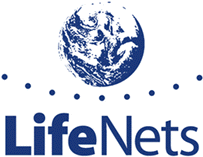 LifeNets wishes to help in its own small way with the the
humanitarian crisis in Japan. Our policy is to help victims
directly. We thank you for all the contributions that we have
received so far. They will go to specific families and we will be
certain that they have received assistance. One of our contacts
who will help us get the aid to victims is Dr. Yumi Yamamoto who
has been a dear friend and supporter of LifeNets for several years. She
has visited and stayed with us in the United States. She is an
ophthalmologist. We will be posting reports from her on this page
regularly.
LifeNets wishes to help in its own small way with the the
humanitarian crisis in Japan. Our policy is to help victims
directly. We thank you for all the contributions that we have
received so far. They will go to specific families and we will be
certain that they have received assistance. One of our contacts
who will help us get the aid to victims is Dr. Yumi Yamamoto who
has been a dear friend and supporter of LifeNets for several years. She
has visited and stayed with us in the United States. She is an
ophthalmologist. We will be posting reports from her on this page
regularly.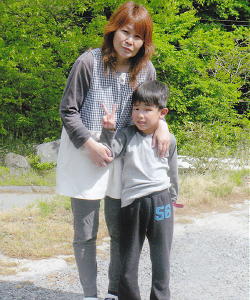
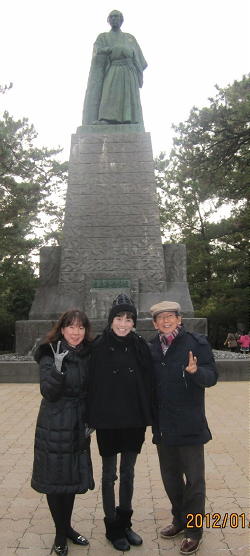
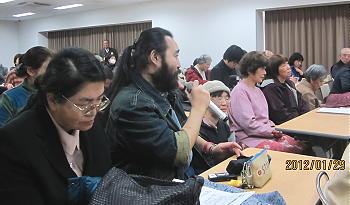
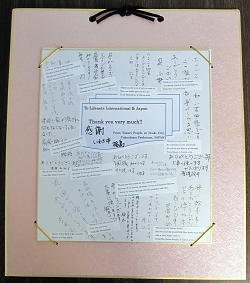 It
was a wonderful surprise a few days ago when we received a "thank you"
card from Japan beautifully and thoughtfully created by the people we
had helped. The card is shown on the right To see a closer
up of the card
It
was a wonderful surprise a few days ago when we received a "thank you"
card from Japan beautifully and thoughtfully created by the people we
had helped. The card is shown on the right To see a closer
up of the card 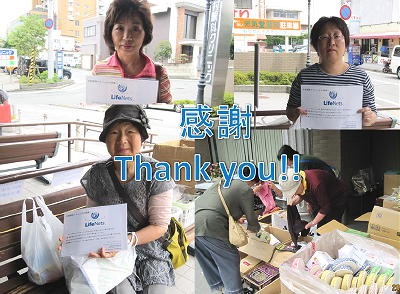
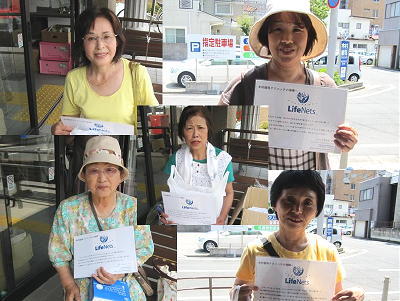
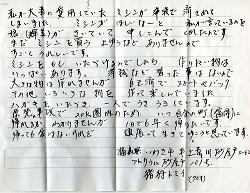
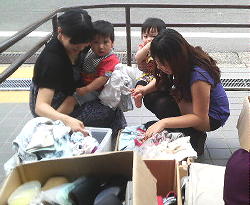
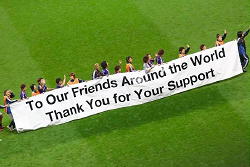
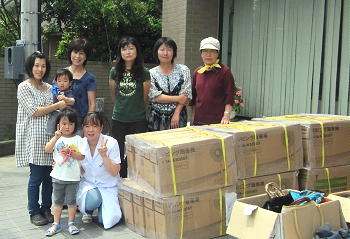
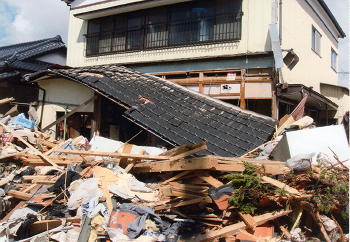
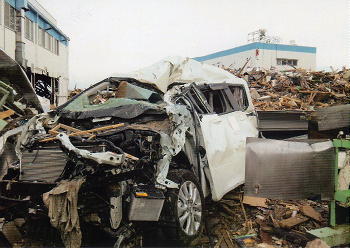
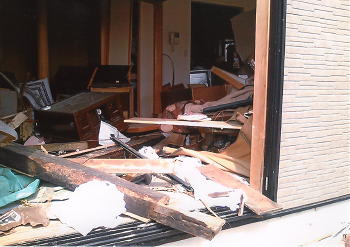
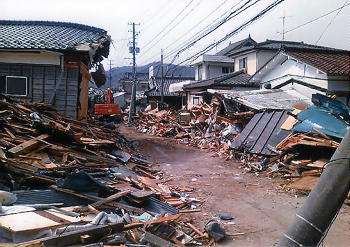
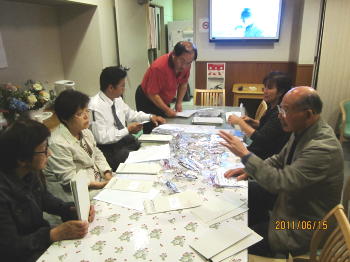
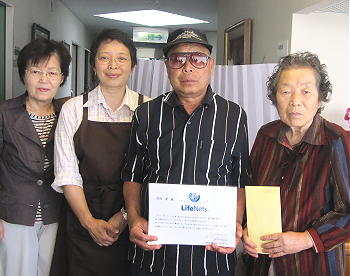
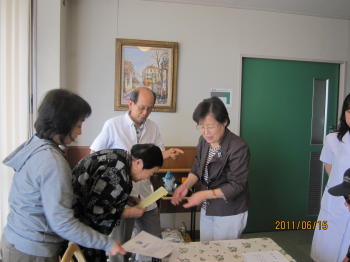
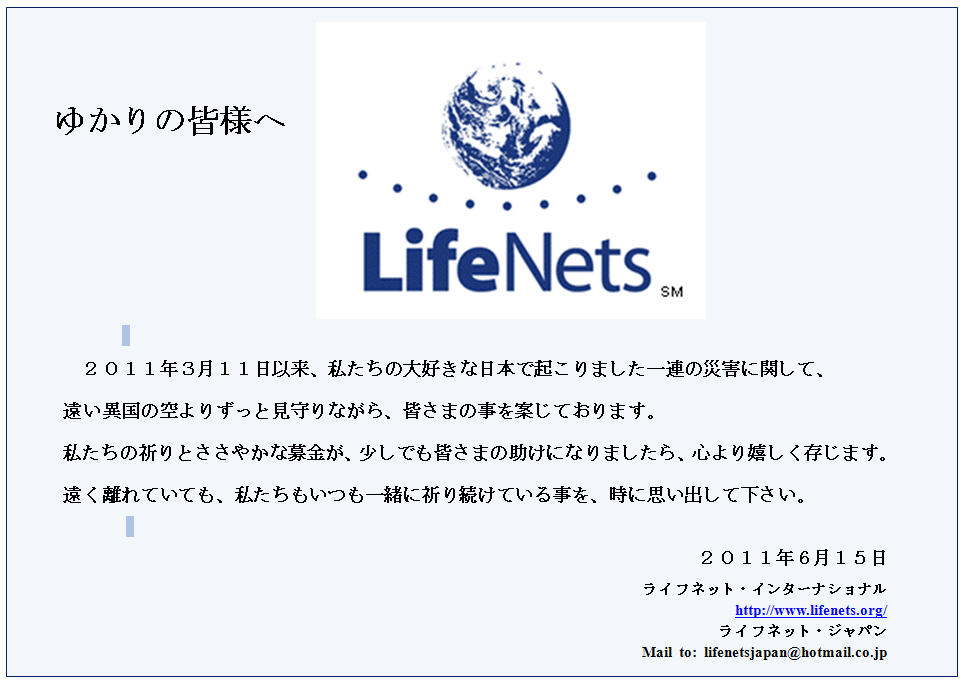
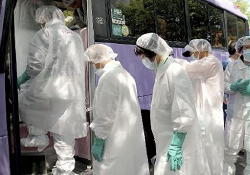
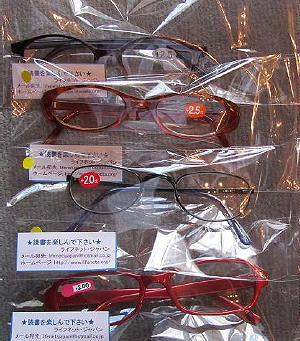

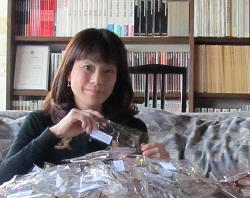
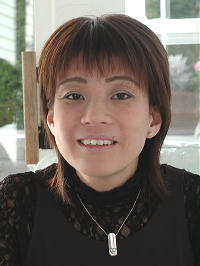
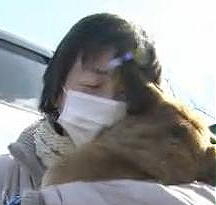
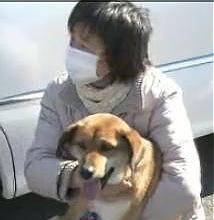
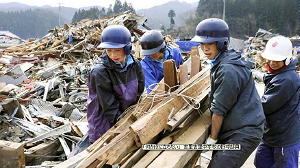 Police
reported it was difficult to carry the bodies to the safe area due to
the risk of a second contamination. Even at the mortuaries, it was
difficult for policemen, doctors and families to identify each person or
mourn their death in the risk of the contamination from the bodies.
These bodies might not be buried because the soil could be contaminated.
Or they might not be burned because contaminated smoke could diffuse
into the air.
Police
reported it was difficult to carry the bodies to the safe area due to
the risk of a second contamination. Even at the mortuaries, it was
difficult for policemen, doctors and families to identify each person or
mourn their death in the risk of the contamination from the bodies.
These bodies might not be buried because the soil could be contaminated.
Or they might not be burned because contaminated smoke could diffuse
into the air.